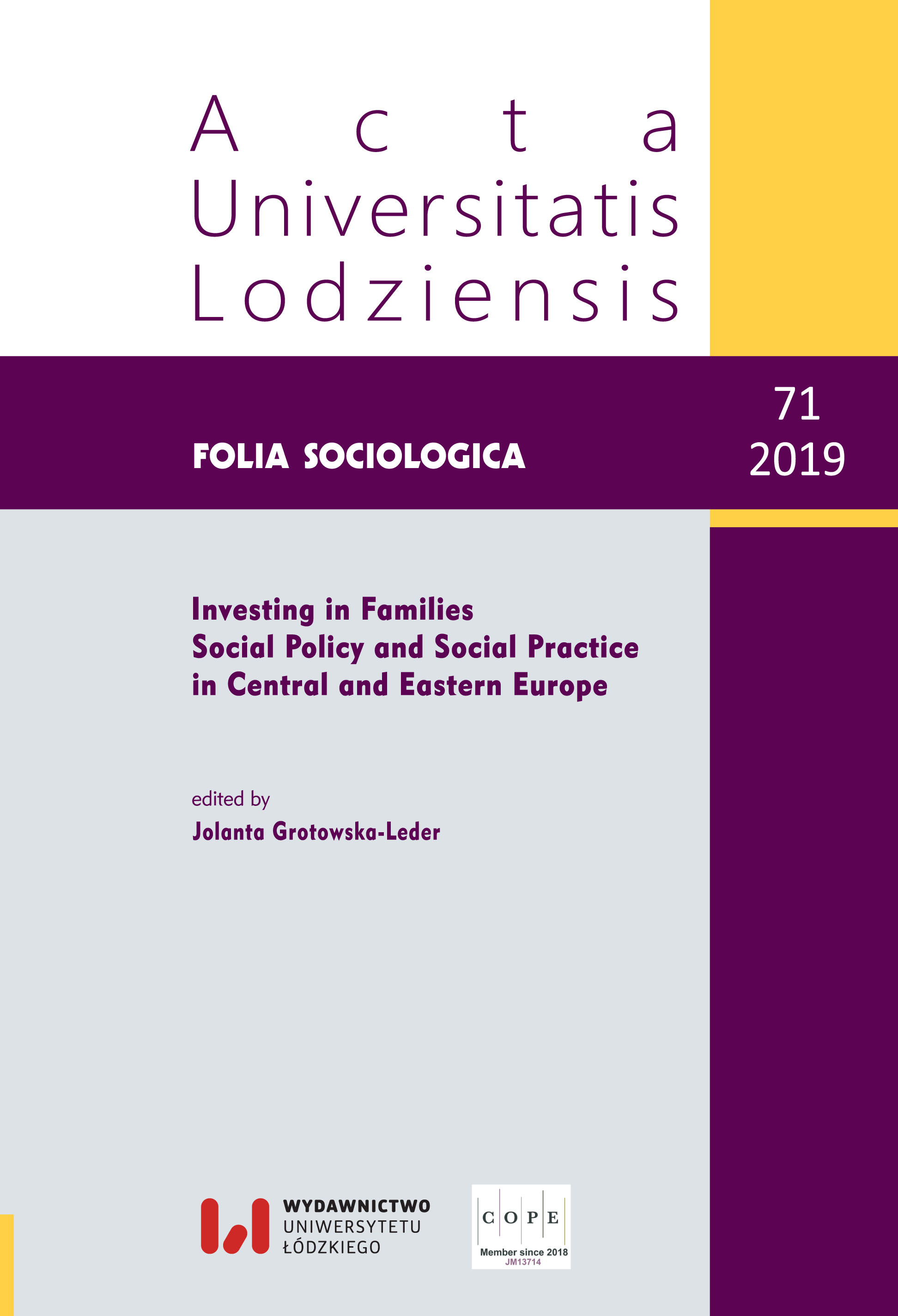Dysfunctionality of the family environment as one of the reason for recidivism
DOI:
https://doi.org/10.18778/0208-600X.71.04Keywords:
family, recidivism, patterns, relationsAbstract
The family as a basic social cell, the first human life environment, plays a fundamental role in securing needs, transferring social patterns and protecting its members. Taking into account the different family models that exist in the modern world, apart from traditional and reconstructed families, we also distinguish dysfunctional families, which does not immediately mean that they are pathological ones. Properly populating parental functions is one of the most important tasks of the family. It is a family that creates educational, caring and socializing environment for a child, where the characteristics of its personality and identity are evolving, as well as social norms are assimilated and associated with adequate sanctions. Family type and model can have a significant impact on the emergence of criminal behavior in adulthood. The author’s studies in the years 2007–2011 show that family relationships are the most significant factor in the biographies of prisoners. Besides, it has been shown that to start criminal activities and subsequent returns to such activities, they correlate with educational problems and numerous addictions in the family (from alcohol, drugs, psychoactive substances, gambling, etc.). The dysfunctions that arise as a result of the socialization process and the building of daily relationships can be linked to the entry into the criminal way of a young man, and thus foster a return to negative habits and recidivism in the future. The article aims to show the relationship between the being brought up in the dysfunctional family and the entrance to a criminal path, which may also be regarded as one of the causes of later recidivism of individuals.
References
Ambrozik W. (1983), Sytuacja społeczna dziecka w rodzinie alkoholicznej, Uniwersytet im. Adama Mickiewicza w Poznaniu: Seria Psychologia i Pedagogika, Poznań.
Google Scholar
Bandura A. (2007), Teoria społecznego uczenia się, Wydawnictwo Naukowe PWN, Warszawa.
Google Scholar
Brągiel J. (1994), Rodzinne i osobowościowe uwarunkowanie sukcesu szkolnego dziecka z rodziny rozwiedzionej, Wydawnictwo Uniwersytetu Opolskiego, Opole.
Google Scholar
Brągiel J., Janke A.W., Kawula S. (2004), Pedagogika rodziny. Obszary i panorama problematyki, Wydawnictwo Adam Marszałek, Toruń.
Google Scholar
Brągiel J., Janke A.W., Kawula S. (2014), Pedagogika rodziny, Wydawnictwo Naukowe PWN, Toruń.
Google Scholar
Cudak H. (2011), Dysfunkcje rodziny i jej zagrożenia opiekuńczo-wychowawcze, “Pedagogika Rodziny. Family Pedagogy”, no. 1(2).
Google Scholar
Gucwa-Porębska K. (2016), Trudności adaptacyjne i pomoc postpenitencjarna dla seniorów skazanych opuszczających zakład karny, [in:] B. Nowak (ed.), Praca socjalna XXI wieku: potrzeby, wyzwania, oczekiwania, J&L Leszek Żochowski, Gliwice 2016.
Google Scholar
Kawula S. (2006), Rodzina o skumulowanych czynnikach patogennych, [in:] S. Kawula, J. Brągiel, A.W. Janke (eds.), Pedagogika rodziny, Wydawnictwo Adam Marszałek, Toruń.
Google Scholar
Kawula S. (2007), Pedagogiczna typologizacja rodzin, [in:] S. Kawula, J. Brągiel, A.W. Janke (eds.), Pedagogika rodziny. Obszary i panorama problematyki, Wydawnictwo Adam Marszałek, Toruń.
Google Scholar
Marek A. (2003), Prawo karne, Wydawnictwo C.H. Beck, Warszawa.
Google Scholar
Niewiadomska I. (2007), Osobowościowe uwarunkowania skuteczności kary pozbawienia wolności, Wydawnictwo KUL, Lublin.
Google Scholar
Przybyłka A. (1999), Dysfunkcja rodziny w okresie transformacji ustrojowej, [in:] Polityka społeczna wobec reform, Katowice.
Google Scholar
Schier K. (2017), Dorosłe dzieci. Psychologiczna problematyka odwrócenia ról w rodzinie, Wydawnictwo Naukowe Scholar, Warszawa.
Google Scholar
Stankiewicz J. (2016), Recydywa wśród młodocianych sprawców przestępstw w świetle teorii społecznego uczenia się, “Zeszyt Studencki Kół Naukowych Wydziału Prawa i Administracji UAM”, no. 6.
Google Scholar
Szostak M. (2000), W poszukiwaniu odpowiedzi. Rozważania o przestępczości i jej etiologii, “Przegląd Prawa i Administracji”, vol. XLV.
Google Scholar
Tyszka Z. (1980), Metodologiczne problemy badań nad rodziną, Wydawnictwo Naukowe Uniwersytetu im. A. Mickiewicza, Poznań.
Google Scholar
Urban B. (2000), Zachowania dewiacyjne młodzieży, Wydawnictwo Uniwersytetu Jagiellońskiego, Kraków.
Google Scholar
Ustawa z dnia 6 czerwca 1997 r. Kodeks karny Dz.U. 2018.0.1600 t.j. http://edukacjaidialog.pl/archiwum/2009,261/kwiecien,301/nasze_sprawy,309/stygmatyzacja_spoleczna,2199.html (accessed 25.01.2019).
Google Scholar
https://isws.ms.gov.pl/pl/baza-statystyczna/publikacje/download,3502,1.html (accessed 15.01.2019).
Google Scholar
https://sjp.pwn.pl/slowniki/recydywa.html (accessed 8.01.2019).
Google Scholar










